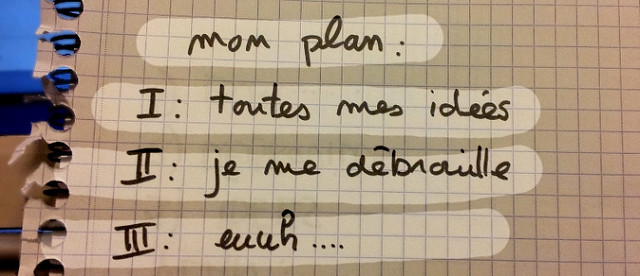What’s The Problem? – Writing A Thesis In French Posted by John Bauer on Aug 31, 2016 in Culture, Vocabulary
These past few weeks I’ve been hard at work on mon mémoire (my thesis). The last big project for un diplôme (a degree) is always hard, and writing un mémoire in another language makes the whole process even more of un casse-tête (a headache).
I came to France to do mon master (my Master’s), and it has been an interesting exeprience learning how nobody’s perfect and what a CM and TD are. Now hard at work on mon mémoire, I’m struggling to find enough café (coffee) to keep me going.
Writing more than cinquante pages (fifty pages) en français has been tough. I can’t tell you how many times I’ve mixed up the words une mémoire (a memory) and un mémoire (a thesis). Not to mention all the other dual gender nouns.
To make things easier, le mémoire should follow le plan (the outline), but sometimes il est difficile de savoir par où commencer (it’s hard to know where to start).
Figuring out une problématique is a big part of writing un mémoire. Once you have une idée (an idea) you have to fix not just le grammaire (the grammar), but le raisonnement et la logique (the reasoning and logic) as well.
C’est quoi une problématique ?
What is une problématique?
Une problématique is a thesis statement to some people. In my experience, they are used in the same general educational contexts. Cependant (however), they do not mean exactly the same thing.
The word for a thesis statement is une thèse principale or un énoncé de la thèse.
It’s a subtle difference, but la problématique is more about defining the research problem or outlining the research problem rather than a summary of the main point or presenting un point de vue (a point of view) and making a claim.
It can be difficult to understand how to succeed in the French education system without understanding this difference. Surtout (especially) because in the classroom you’ll hear le professeur (the professor) talk about the importance of la problématique in the same way you would hear le professeur talk about the thesis statement in aux États-Unis (in the United States).
There is also a lot to learn about les travaux universitaires (academic writing). All the nuances of specific wordings can easily get lost in translation. The main ideas of writing clearly, citing your sources, creating a bibliography, and proper formatting are all the same, but the details can be different enough that figuring out how to write correctly is un casse-tête.
De plus (what’s more), if you went to school in the US, you are probably familiar with MLA or APA formatting and it’s hard to realize that those are American guidelines.
Ne vous inquiétez pas !
Don’t worry!
In France, all the information you need is in le guide de mise en page (the style guide) provided by le professeur.
Maintenant (now), the biggest problem I have is that with la canicule it’s too hot to drink du café!

Build vocabulary, practice pronunciation, and more with Transparent Language Online. Available anytime, anywhere, on any device.





